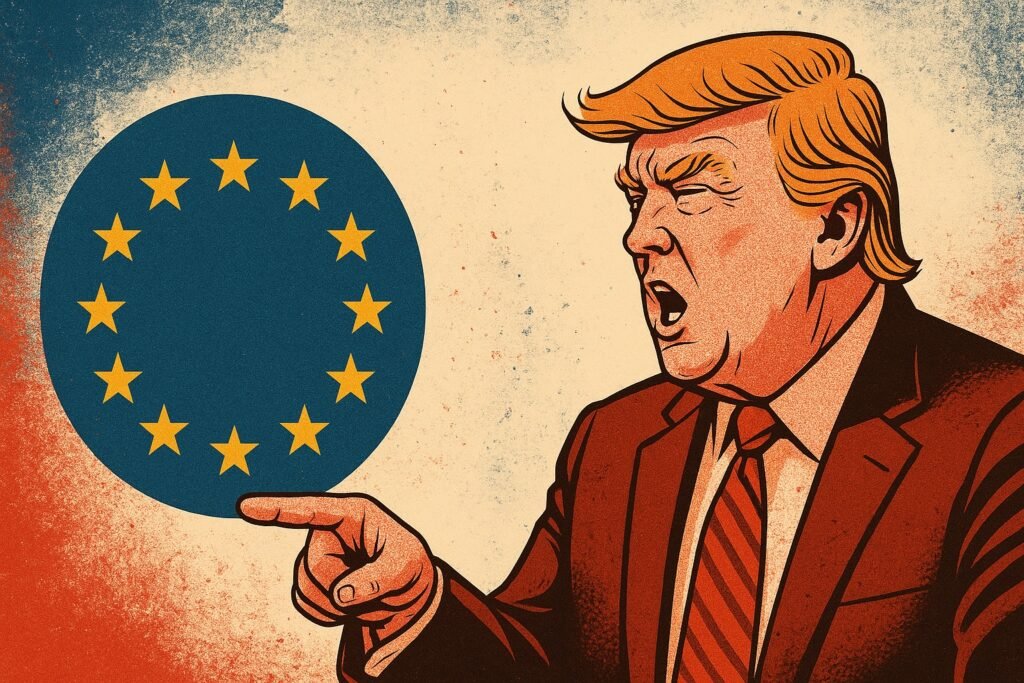Europe regulates, America innovates. It’s a popular meme on social media, and thanks to our Change-Agent-In-Chief, President Trump, we can add to that: Trump dominates.
The president’s recent executive actions to reverse discriminatory regulations and “non-tariff barriers” aimed at U.S. tech giants, not to mention snarky comments on free speech, have changed the game on how far-reaching European regulations impact users here at home. Trump even laid into Europe on Truth Social, declaring they could no longer treat US firms as both a “piggy bank” and a “doormat.”
Former EU Commissioner Thierry Breton took to the pages of The Guardian to protest Trump’s approach and urge the EU not to give one inch. His worldview is failing.
Trump is often derided as a “bully,” as Breton implies. You can go back to 2016 and find him saying things like, “My whole life I’ve been greedy — now I want to be greedy for the United States.” Trump has been putting his vices to good use, and the EU needs some bullying.
The issue of Brussels’ punitiveness has cast a shadow on the administration’s trade negotiations with the European bloc. Trump is reportedly now considering sanctions on European officials who push these punitive digital policies.
It’s not often an American politician so brazenly turns the screws on political allies to get them to change policy, but considering the major regulatory projects of Europe in recent years, it’s a relief.
Friends don’t treat friends this way, and it’s been a hallmark of Trump-Vance to say as much.
Through the Digital Services Act (DSA) and the Digital Markets Act (DMA), Brussels exports rules that censor speech, weaken encryption, and make it harder for U.S. innovators to compete abroad. On the continent, these were sold to Europeans as “consumer protection.” In practice, they serve as an international straitjacket punishing American consumers and entrepreneurs just as much as EU citizens.
In a report released last month, the House Judiciary Committee outlined the looming issues with the EU’s digital rules and their knack for fueling platform-led censorship.
The DSA places extraordinary demands on “Very Large Online Platforms,” including risk audits, mandatory algorithm disclosures, and data-access requirements that compromise consumer privacy and innovation simultaneously. Worse still, the law empowers EU commissioners to pressure platforms into moderating political speech when when that speech originates in the United States.
Thierry Breton had no problem abusing the powers afforded to him under the DSA, publicly threatening X (formerly Twitter) ahead of a livestream between Elon Musk and then-candidate Donald Trump during the 2024 election.
The DMA, on the other hand, claims to fight monopolies by targeting so-called “gatekeepers,” but in reality is a thinly disguised industrial policy tilted against American companies. Of the seven designated gatekeepers, five are American firms: Google, Apple, Amazon, Meta, and Microsoft.
The DMA forces them to open services to competitors, restructure their app stores, and accept steep fines of up to 6 percent of global revenue for infractions. European consumers lose out on new digital services, and Americans face higher compliance costs passed along via subscription fees. Everybody loses.
The results are easy to see in the marketplace. Apple withheld new iOS features like iPhone Mirroring and Visited Places in Maps from EU users to avoid legal peril. Even Google Search has been forced to strip away integration with Google Maps, frustrating users everywhere.
All this is happening as AI-powered Internet search disrupts the industry. No one who has dabbled in OpenAI or Grok for search could credibly claim Google is still the only game in town.
As troubling as the DSA and DMA are, they’re only the start. Brussels is advancing the so-called “Chat Control” regulations that require scanning private messages for child abuse material, giving law enforcement unprecedented tools to monitor chats. Naturally, authorities will stumble upon unrelated crimes, which is likely the point.
The United Kingdom already tried to force Apple to weaken iCloud encryption. Only after Vice President JD Vance took a detour while on his family trip to Scotland to sternly warn the British government was it scrapped. If Europe pushes ahead, Americans who rely on WhatsApp, iMessage, Signal, or any other encrypted app will face the same downsides.
For American consumers, these rules mean higher prices, weaker security, and more constraints on free speech.
When Europe regulates Silicon Valley, the effects don’t stop at its cobblestoned streets. EU rulemaking functions as digital neo-colonialism that forces its way into US app stores, search engines, and Americans’ digital wallets. That’s why tradecraft and statecraft must be at the heart of America’s response and why Trump’s unorthodox approach is a worthwhile gambit.
Using American leverage in trade negotiations to challenge discriminatory rules isn’t standard diplomacy, but it has worked in defiance of conventional wisdom in Washington.
Playing nice isn’t a strategy — it’s the endgame.
The president doesn’t get perfect marks on his approach, but if the policies driving the administration can reset the discussion in favor of consumers everywhere, and rules get more flexible in such a way as to protect encryption and the principles of an open internet, it is a worthwhile approach.
As long as the antitrust faction of MAGA doesn’t harm domestic innovators, as many of President Trump’s appointees at FTC and DOJ seem hellbent on doing, there is good reason to champion the president’s aims on digital policies on the international stage.
Yaël Ossowski is deputy director at the Consumer Choice Center.
Published in Daily Caller (archive #1)
